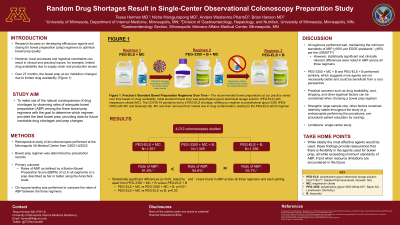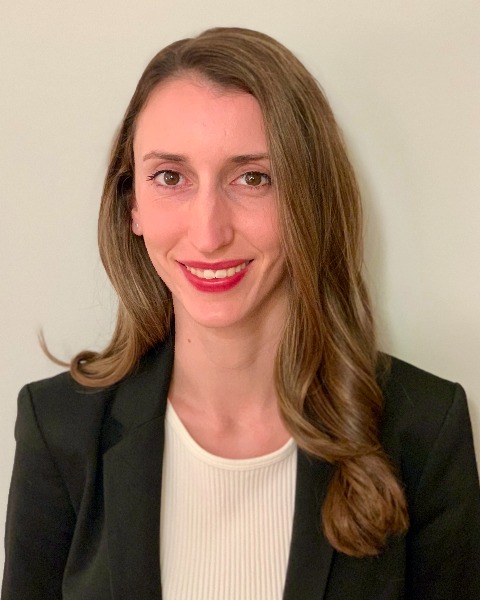Tuesday Poster Session
Category: Practice Management
P4076 - Random Drug Shortages Result in Single Center Observational Colonoscopy Preparation Study
Tuesday, October 24, 2023
10:30 AM - 4:00 PM PT
Location: Exhibit Hall

Has Audio

Tessa Herman, MD
University of Minnesota
Minneapolis, MN
Presenting Author(s)
Tessa Herman, MD1, Nicha Wongjarupong, MD1, Anders Westanmo, PharmD2, Brian J. Hanson, MD2
1University of Minnesota, Minneapolis, MN; 2Minneapolis VA Medical Center, Minneapolis, MN
Introduction: Adequate bowel preparation (ABP) is essential for colonoscopy. Research has focused on developing efficacious agents and dosing for bowel preparation (prep) regimens to optimize endoscopic visualization. However, local processes and logistical constraints can limit available drugs for bowel prep resulting in clinical and practical issues. Recent SARS-CV2 pandemic-related supply chain issues and other drug shortages are key examples. Over 27 months, the bowel prep used at our institution changed related to drug availability. The standard prep was polyethylene glycol electrolyte lavage solution with magnesium citrate (PEG-ELS + MC), but a PEG-ELS shortage required a shift to polyethylene glycol 3350 plus MC and bisacodyl (PEG-3350 + MC + B). When PEG-ELS became available again, we moved to PEG-ELS + MC only to see MC removed from the market due to contamination requiring a shift to PEG-ELS and bisacodyl (PEG-ELS + B). The aim of this study was to make use of the natural consequences of drug shortages by observing rates of ABP among these regimens, to determine which regimen provided the best bowel prep, and to provide data for future inevitable drug shortages and prep changes.
Methods: This represents a retrospective study of all colonoscopies done at our institution from 3/2021 – 5/2023. Bowel prep regimen was determined by prescription records. The primary outcome was rates of ABP, as defined as a Boston Bowel Preparation Score (BBPS) of ≥ 2 in all segments or fair or better prep using the Aronchick scale. Statistical analysis comparing the three regimens was done using chi-square testing.
Results: After removing cases without bowel prep quality data, 4,012 colonoscopies were included. The rates of ABP were 91.6% (n=1,351) for PEG-ELS + MC, 94.1% (n=1,305) for PEG-3350 + MC + B, and 93.7% (n=1,356) for PEG-ELS + B (p=0.02) (Table 1).
Discussion: Statistically significant and relative clinical differences were noted in ABP across all three regimens. There was no statistical difference between PEG-3350 + MC + B and PEG-ELS + B. All regimens performed well and thus practical concerns such as drug availability, cost, shipping, renal function, and other practical factors can be considered when choosing a regimen. While ideally the most effective agents would be utilized, these findings provide reassurance that there is flexibility in the agents used for bowel prep, all while maintaining minimum standards of ABP, for when, not if, we face resource limitations in the future.
Disclosures:
Tessa Herman, MD1, Nicha Wongjarupong, MD1, Anders Westanmo, PharmD2, Brian J. Hanson, MD2. P4076 - Random Drug Shortages Result in Single Center Observational Colonoscopy Preparation Study, ACG 2023 Annual Scientific Meeting Abstracts. Vancouver, BC, Canada: American College of Gastroenterology.
1University of Minnesota, Minneapolis, MN; 2Minneapolis VA Medical Center, Minneapolis, MN
Introduction: Adequate bowel preparation (ABP) is essential for colonoscopy. Research has focused on developing efficacious agents and dosing for bowel preparation (prep) regimens to optimize endoscopic visualization. However, local processes and logistical constraints can limit available drugs for bowel prep resulting in clinical and practical issues. Recent SARS-CV2 pandemic-related supply chain issues and other drug shortages are key examples. Over 27 months, the bowel prep used at our institution changed related to drug availability. The standard prep was polyethylene glycol electrolyte lavage solution with magnesium citrate (PEG-ELS + MC), but a PEG-ELS shortage required a shift to polyethylene glycol 3350 plus MC and bisacodyl (PEG-3350 + MC + B). When PEG-ELS became available again, we moved to PEG-ELS + MC only to see MC removed from the market due to contamination requiring a shift to PEG-ELS and bisacodyl (PEG-ELS + B). The aim of this study was to make use of the natural consequences of drug shortages by observing rates of ABP among these regimens, to determine which regimen provided the best bowel prep, and to provide data for future inevitable drug shortages and prep changes.
Methods: This represents a retrospective study of all colonoscopies done at our institution from 3/2021 – 5/2023. Bowel prep regimen was determined by prescription records. The primary outcome was rates of ABP, as defined as a Boston Bowel Preparation Score (BBPS) of ≥ 2 in all segments or fair or better prep using the Aronchick scale. Statistical analysis comparing the three regimens was done using chi-square testing.
Results: After removing cases without bowel prep quality data, 4,012 colonoscopies were included. The rates of ABP were 91.6% (n=1,351) for PEG-ELS + MC, 94.1% (n=1,305) for PEG-3350 + MC + B, and 93.7% (n=1,356) for PEG-ELS + B (p=0.02) (Table 1).
Discussion: Statistically significant and relative clinical differences were noted in ABP across all three regimens. There was no statistical difference between PEG-3350 + MC + B and PEG-ELS + B. All regimens performed well and thus practical concerns such as drug availability, cost, shipping, renal function, and other practical factors can be considered when choosing a regimen. While ideally the most effective agents would be utilized, these findings provide reassurance that there is flexibility in the agents used for bowel prep, all while maintaining minimum standards of ABP, for when, not if, we face resource limitations in the future.
Disclosures:
Tessa Herman indicated no relevant financial relationships.
Nicha Wongjarupong indicated no relevant financial relationships.
Anders Westanmo indicated no relevant financial relationships.
Brian Hanson: Motus GI – Consultant.
Tessa Herman, MD1, Nicha Wongjarupong, MD1, Anders Westanmo, PharmD2, Brian J. Hanson, MD2. P4076 - Random Drug Shortages Result in Single Center Observational Colonoscopy Preparation Study, ACG 2023 Annual Scientific Meeting Abstracts. Vancouver, BC, Canada: American College of Gastroenterology.
